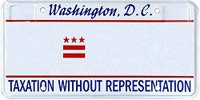Towards Voluntaryism (Part 33)
3.11.5. Citizen's Arrest Laws V: South Dakota - Wyoming + Washington D.C.
Towards Voluntaryism (Part 33)
Citizen's Arrest Laws V: South Dakota - Wyoming + Washington D.C.
41. South Dakota
Universal Citation: SD Codified L § 23A-3-3 (2017)
23A-3-3. Citizen's arrest. Any person may arrest another:
(1) For a public offense, other than a petty offense, committed or attempted in his presence; or
(2) For a felony which has been in fact committed although not in his presence, if he has probable cause to believe the person to be arrested committed it.
2017 South Dakota Codified Laws Title 23A - CRIMINAL PROCEDURE Chapter 03 - (Rule 4.1) Arrest § 23A-3-4 Advice as to authority and cause of arrest without warrant.
Universal Citation: SD Codified L § 23A-3-4 (2017)
23A-3-4. Advice as to authority and cause of arrest without warrant. When arresting a person without a warrant, the person making the arrest must inform the person to be arrested of his authority and the cause of the arrest, and require him to submit, except when the person to be arrested is engaged in the actual commission of an offense or when he is arrested on pursuit immediately after its commission.
Universal Citation: SD Codified L § 23A-3-5 (2017)
23A-3-5. Manner of making arrest--Physical restraint--Weapons and contraband property--Breaking structure to make arrest. An arrest is made by an actual or attempted restraint of the person arrested or by his submission to the custody of the person making the arrest. No person shall subject an arrested person to more physical restraint than is reasonably necessary to effect the arrest. Any person making an arrest may take from the arrested person all dangerous weapons and property as defined in § 23A-35-3 which the arrested person may have about his person.
Any law enforcement officer having authority to make an arrest may break open an outer or inner door or window of a dwelling house or other structure for the purpose of making the arrest if, after giving reasonable notice of his intention, he is refused admittance, and if:
(1) The law enforcement officer has obtained an arrest warrant; or
(2) Exigent circumstances justify a warrantless arrest.
42. Tennessee
Universal Citation: TN Code § 40-7-101 (2017)
An arrest may be made either by:
(1) An officer under a warrant;
(2) An officer without a warrant; or
(3) A private person.
Universal Citation: TN Code § 40-7-106 (2017)
(a) When arresting a person, the officer shall inform the person of the officer's authority and the cause of the arrest, and exhibit the warrant if the officer has one, except when the person is in the actual commission of the offense or is pursued immediately after an escape.
(b) No person under arrest by any officer or private citizen shall be named in any book, ledger or any other record until after the person has successfully completed a telephone call to an attorney, relative, minister or any other person that the person shall choose, without undue delay. One (1) hour shall constitute a reasonable time without undue delay. However, if the arrested person does not choose to make a telephone call, then the person shall be booked or docketed immediately.
Universal Citation: TN Code § 40-7-109 (2017)
(a) A private person may arrest another:
(1) For a public offense committed in the arresting person's presence;
(2) When the person arrested has committed a felony, although not in the arresting person's presence; or
(3) When a felony has been committed, and the arresting person has reasonable cause to believe that the person arrested committed the felony.
(b) A private person who makes an arrest of another pursuant to §§ 40-7-109 -- 40-7-115 shall receive no arrest fee or compensation for the arrest.
2017 Tennessee Code Title 40 - Criminal Procedure Chapter 7 - Arrest Part 1 - General Provisions § 40-7-110. Arrest by private person -- Time.
Universal Citation: TN Code § 40-7-110 (2017)
A private person may make an arrest for a felony at any time.
Universal Citation: TN Code § 40-7-111 (2017)
A private person making an arrest shall, at the time of the arrest, inform the person arrested of the cause of the arrest, except when the person is in the actual commission of the offense, or when arrested on pursuit.
Universal Citation: TN Code § 40-7-112 (2017)
If the person to be arrested has committed a felony, and a private person, after notice of the person's intention to make the arrest, is refused admittance, the arresting person may break open an outer or inner door or window of a dwelling house to make the arrest.
Universal Citation: TN Code § 40-7-113 (2017)
(a) A private person who has arrested another for a public offense shall, without unnecessary delay, take the arrested person before a magistrate or deliver the arrested person to an officer.
(b) An officer may take before a magistrate, without a warrant, any person who, being engaged in the commission of a public offense, is arrested by a bystander and delivered to the officer, and anyone arrested by a private person as provided in §§ 40-7-109 -- 40-7-112, and delivered to the officer.
In Tennessee, it has been held that a private citizen has the right to arrest when a felony has been committed and he has reasonable cause to believe that the person arrested committed it. Reasonable grounds will justify the arrest, whether the facts turn out to be sufficient or not. (See Wilson v. State, 79 Tenn. 310 (1833).
43. Texas
The only statute directly addressing the right to execute a citizen's arrest is found in:
2017 Texas Statutes CODE OF CRIMINAL PROCEDURE TITLE 1 - CODE OF CRIMINAL PROCEDURE CHAPTER 14 - ARREST WITHOUT WARRANT
CODE OF CRIMINAL PROCEDURE
TITLE 1. CODE OF CRIMINAL PROCEDURE
CHAPTER 14. ARREST WITHOUT WARRANT
Art. 14.01. OFFENSE WITHIN VIEW. (a) A peace officer or any other person, may, without a warrant, arrest an offender when the offense is committed in his presence or within his view, if the offense is one classed as a felony or as an offense against the public peace.
(b) A peace officer may arrest an offender without a warrant for any offense committed in his presence or within his view.
Case law in Texas provides further guidance in executing a citizen's arrest, which has been detailed by Simon Azar-Farr: "The Right to Effect a Citizen's Arrest Under Texas Law" in San Antonio Lawyer 12 (May-June 2008). I recommend reading it in its entirety to clearly understand the limitations of performing a citizen's arrest in Texas, here however a common caveat that is present in many other states' statutes:
"A citizen making a warrantless arrest may adopt all the measures that may be adopted in cases of arrest under warrant. Whenever a citizen makes an arrest, the person arrested must be taken without unnecessary delay before a magistrate in the county in which the person was arrested or, if it would be faster, before a magistrate in a county bordering the county in which the arrest was made."
44. Utah
Universal Citation: UT Code § 77-7-3 (2017)
77-7-3. By private persons.
A private person may arrest another:
(1) For a public offense committed or attempted in his presence; or
(2) When a felony has been committed and he has reasonable cause to believe the person arrested has committed it.
Universal Citation: UT Code § 77-7-6 (2017)
Effective 5/9/2017
77-7-6. Manner of making arrest.
(1) The person making the arrest shall inform the person being arrested of his intention, cause, and authority to arrest him. Such notice shall not be required when:
(a) there is reason to believe the notice will endanger the life or safety of the officer or another person or will likely enable the party being arrested to escape;
(b) the person being arrested is actually engaged in the commission of, or an attempt to commit, an offense; or
(c) the person being arrested is pursued immediately after the commission of an offense or an escape.
(2)
(a) If a deaf or hard of hearing person, as defined in Subsection 78B-1-201(2), is arrested for an alleged violation of a criminal law, including a local ordinance, the arresting officer shall assess the communicative abilities of the deaf or hard of hearing person and conduct this notification, and any further notifications of rights, warnings, interrogations, or taking of statements, in a manner that accurately and effectively communicates with the deaf or hard of hearing person, including qualified interpreters, lip reading, pen and paper, typewriters, computers with print-out capability, and telecommunications devices for the deaf.
(b) Compliance with this Subsection (2) is a factor to be considered by any court when evaluating whether statements of a deaf or hard of hearing person were made knowingly, voluntarily, and intelligently.
Universal Citation: UT Code § 77-7-7 (2017)
77-7-7. Force in making arrest.
If a person is being arrested and flees or forcibly resists after being informed of the intention to make the arrest, the person arresting may use reasonable force to effect the arrest. Deadly force may be used only as provided in Section 76-2-404.
2017 Utah Code Title 77 - Utah Code of Criminal Procedure Chapter 7 - Arrest, by Whom, and How Made Section 9 - Weapons may be taken from prisoner.
Universal Citation: UT Code § 77-7-9 (2017)
77-7-9. Weapons may be taken from prisoner.
Any person making an arrest may seize from the person arrested all weapons which he may have on or about his person.
45. Vermont
Solutions Institute states "We could not find the official citizen’s arrest statute in Vermont. 13-59-4954 lays out the grounds for a citizens arrest on someone charged with a crime in another state, who would need to be extradited, but we cannot find any statutes related to citizens warrantless arrest of individuals outside that category." I have also sought to find Vermont case law and court decisions pertaining to citizen's arrest or arrest by any person to no success.
Universal Citation: 13 V.S.A. § 4954
§ 4954. Arrest without a warrant
The arrest of a person may be lawfully made by an officer or a private citizen without a warrant upon reasonable information that the accused stands charged in the courts of another state with a crime punishable by death or imprisonment for a term exceeding one year. When so arrested, the accused shall be taken before a Superior Court judge as soon as may be, and complaint shall be made against him or her under oath, setting forth the ground for the arrest as in section 4953 of this title; and thereafter his or her answer shall be heard as if he or she had been arrested on a warrant.
46. Virginia
I have been unable to find a specific statute for Virginia governing citizen's arrests. Title 19.2-100 treats citizen's arrests for extradition of someone accused of crime in another state. Otherwise case law is our best recourse.
"Law of Arrest in Virginia" in Washington and Lee Law Review - Volume 21, Issue 2, Article 7 (9-1-1964) Here the most relevant passages:
"2-4. Arrest by private persons. A private person may make a citizen's arrest, as at common law. When empowered to execute a warrant, a private citizen is clothed with the authority of a law officer while acting in this capacity." p. 256. References Randolph vs. Commonwealth.
"9. Arrest without warrant: by private persons.
Language in the cases is suggestive of the common law rule that a private person may arrest for crimes, be they felonies or misdemeanors, committed in his presence, but never is there an unequivocal statement that this is the law. It may, however, be assumed so, since the law of arrest in Virginia follows, for the most part, the common law (Muscoe v. Commonwealth).
As to felonies, the following comes closest to an explicit statement of the common law rule:
'...to prevent the consummation fo this felony any officer had the right to arrest him with or without a warrant, and any private citizen had that right whether to aid an officer or not.' (Byrd vs. Commonwealth)
In another case (Hill v. Smith), it is said a private person may arrest, if a felony has been committed and there are reasonable grounds of suspicion, presumably meaning suspicion that the one sought to be arrested is the felon.
As to misdemeanors, it is said:
'But, in general, in cases of misdemeanor, a constable or pther peace officer cannot, any more than a private person, justify the arrest of the offender without warrant when the offense was not cimmitted in his presence (Muscoe v Commonwealth).'
As to breaches of the peace, a treatise asserts (2 Michie's Jurisprudence: Virginia and West Virginia 91 (1948)) that a private citizen may arrest without warrant for a breach of the peace committed in his presence; but the case cited in support is a federal case, from Virginia and there seems to be no state decision on the point" pp. 271-272.
Universal Citation: VA Code § 19.2-100 (2017)
The arrest of a person may be lawfully made also by any peace officer or private person without a warrant upon reasonable information that the accused stands charged in the courts of a state with a crime punishable by death or imprisonment for a term exceeding one year. But when so arrested the accused shall be taken before a judge, magistrate or other officer authorized to issue criminal warrants in this Commonwealth with all practicable speed and complaint made against him under oath setting forth the ground for the arrest as in the preceding section; and thereafter his answer shall be heard as if he had been arrested on a warrant.
Solutions Institute states: "We could not find an official Washington citizen’s arrest statute. We called their legislative information center, and their law library, and both informed us that the statute does not exist. A 2005 report from the Department of Licensing confirms this..."
Department of Licensing: "Summary of Citizen Arrest" (2005) reproduced here:
"Citizen Arrest in Washington State
Under Washington law, a private person can conduct a citizen’s arrest for a misdemeanor if the misdemeanor: (1) was committed in the citizen’s presence and (2) constituted a breach of the peace. State v. Gonzales, 24 Wn. App. 437, 439, 604 P.2d 168 (1979); Guijosa v. Wal-Mart Stores, 101 Wn. App. 777, 791, 6 P.3d 583 (2000).
A person can also conduct a citizen’s arrest for felonies. See State v. Malone, 106 Wn.2d 607, 724 P.2d 364 at FN1 (1986) citing State v. Miller, 103 Wn.2d 792, 698 P.2d 554 (1985) and State v. Gonzales , 24 Wn. App. 437, 604 P.2d 168 (1979).
RCW 10.04.020 provides for a citizen’s arrest at the direction of a district court judge, as follows: Arrest -- Offense committed in view of district judge.
When any offense is committed in view of any district judge, the judge may, by verbal direction to any deputy, or if no deputy is present, to any citizen, cause such deputy or citizen to arrest such offender, and keep such offender in custody for the space of one hour, unless such offender shall sooner be taken from such custody by virtue of a warrant issued on complaint on oath. But such person so arrested, shall not be confined in jail, nor put upon any trial, until arrested by virtue of such warrant.
While Washington has no statute concerning citizen’s arrests generally, RCW 9A.04.060 provides that the common law is applicable where not repugnant to the provisions of the state constitution or statutes. Gonzales, 24 Wn. App. at 439; State v. Miller, 103 Wn.2d 792, 795, 698 P.2d 554 (1985).
Application of the common law doctrine of citizen’s arrest is demonstrated in the synopsis of the case below:
Instruction on lawful arrest in prosecution for third degree assault, arising from defendant's resistance to apprehension by store personnel, did not improperly state the law; although language was taken from statute which sets forth defense available to store personnel who have detained a suspected shoplifter, statutory language was consistent with common-law right of citizen arrest
which permits detention of a suspected shoplifter on reasonable grounds. State v. Jones (1992) 63 Wash.App. 703, 821 P.2d 543, review denied 118 Wash.2d 1028, 828 P.2d 563. Assault And Battery 96(3); Criminal Law 808.5-"
Similar to other states, there is indeed statute law expressly permitting private persons to perform an arrest if for extradition purposes:
Universal Citation: WA Rev Code § 10.88.330 (2017)
RCW 10.88.330 Arrest without warrant.
(1) The arrest of a person may be lawfully made also by any peace officer or a private person, without a warrant upon reasonable information that the accused stands charged in the courts of a state with a crime punishable by death or imprisonment for a term exceeding one year, but when so arrested the accused must be taken before a judge or magistrate with all practicable speed and complaint must be made against him or her under oath setting forth the ground for the arrest as in RCW 10.88.320; and thereafter his or her answer shall be heard as if he or she had been arrested on a warrant.complaint must be made against him or her under oath setting forth the ground for the arrest as in RCW 10.88.320; and thereafter his or her answer shall be heard as if he or she had been arrested on a warrant.
48. West Virginia
State statute pertaining to citizen's arrest unlocatable by this author. The explicit statement that common law (and thus citizen's arrest under common law) is in effect in WV is however available:
Universal Citation: WV Code § 2-1-1 (2017)
The common law of England, so far as it is not repugnant to the principles of the Constitution of this state, shall continue in force within the same, except in those respects wherein it was altered by the general assembly of Virginia before June 20, eighteen hundred and sixty-three, or has been, or shall be, altered by the Legislature of this state
It has however been possible to locate case law demonstrating that citizen's arrests are accounted for in West Virginia:
State of West Virginia v Arthur Gustke & Mikhail Braverman:
"... 2. A law enforcement officer acting outside of his or her territorial jurisdiction has the same authority to arrest as does a private citizen and may make an extraterritorial arrest under those circumstances in which a private citizen would be authorized to make an arrest.
3. Under the common law, a private citizen is authorized to arrest another who commits a misdemeanor in his or her presence when that misdemeanor constitutes a breach of the peace.
4. Driving while under the influence of alcohol, a controlled substance or drugs, as prohibited by W. Va. Code § 17C-5-2(d) (1996) (Repl. Vol. 1996), constitutes a breach of the peace. Consequently, it is a misdemeanor offense for which a private citizen may arrest."
Similary, Ira P. Robbins: "Vilifying the Vigilante: A Narrowed Scope of Citizen's Arrest" (2016) notes: "The jurisdictions that rely on the common law of citizen's arrest are Connecticut, Delaware, Maryland, Massachusetts, New Hampshire, Pennsylvania, Vermon, West Virginia, and Wisconsin." p. 9, n. 48. Unfortunately, in his discussion, Robbins comes to the dangerous and irresponsible conclusion that "The solution is to abolish citizen's arrest for private citizens and for private citizen watch groups" p. 43, which essentially abandons the foundational principle of the law as being by, of and for the people and completely ignores the clear and present danger of corruption in governance and law enforcement.
49. Wisconsin
Citizen's arrest in Wisconsin is governed by common law and thus no statutes address it in general circumstances. The exception is a statute treating retail theft:
Universal Citation: WI Stat § 943.50 (2017)
943.50 Retail theft; theft of services.
...
(3)A merchant or service provider, a merchant's or service provider's adult employee or a merchant's or service provider's security agent who has reasonable cause for believing that a person has violated this section in his or her presence may detain, within or at the merchant's or service provider's place of business where the suspected violation took place, the person in a reasonable manner for a reasonable length of time to deliver the person to a peace officer, or to his or her parent or guardian in the case of a minor. The detained person must be promptly informed of the purpose for the detention and be permitted to make phone calls, but he or she shall not be interrogated or searched against his or her will before the arrival of a peace officer who may conduct a lawful interrogation of the accused person. The merchant or service provider, merchant's or service provider's adult employee or merchant's or service provider's security agent may release the detained person before the arrival of a peace officer or parent or guardian. Any merchant or service provider, merchant's or service provider's adult employee or merchant's or service provider's security agent who acts in good faith in any act authorized under this section is immune from civil or criminal liability for those acts.
Further, J.B. Van Hollen, Attorney General: "Opinion Correspondence with Mr. Frederick Mohr" (September 4, 2008) states:
Referencing Bergeron v. Peyton, Radloff v National Food Stores and State v. Slavek, "Read together, these cases establish that a citizen can make a felony arrest without a warrant based on probably cause but can make a warrantless arrest for a misdemeanor only if the misdemeanor is committed in the citizen's presence and constitutes a breach of the peace."
50. Wyoming
Universal Citation: WY Stat § 7-8-101 (2017)
7-8-101. Arrest by private person.
(a) A person who is not a peace officer may arrest another for:
(i) A felony committed in his presence;
(ii) A felony which has been committed, even though not in his presence, if he has probable cause to believe the person to be arrested committed it; or
(iii) The following misdemeanors committed in his presence:
(A) A misdemeanor theft offense defined by W.S. 6-3-402; or
(B) A misdemeanor property destruction offense defined by W.S. 6-3-201.
Universal Citation: WY Stat § 7-3-214 (2017)
7-3-214. Authority to arrest person without warrant.
The arrest of a person may be lawfully made by an officer or a private citizen without a warrant upon reasonable information that the accused is charged in the courts of another state with a crime punishable by death or imprisonment for a term exceeding one (1) year. When arrested under this section the accused shall be taken before a judge or magistrate as soon as possible and complaint shall be made against him under oath setting forth the ground for the arrest as in W.S. 7-3-213. Thereafter his answer shall be heard as if he had been arrested on a warrant.
51 Washington D.C.
Washington District of Columbia has its own specific laws under which citizen's arrest is also a valid exercise of law enforcement:
§ 23–582. Arrests without warrant by other persons.
(a) A special policeman shall have the same powers as a law enforcement officer to arrest without warrant for offenses committed within premises to which his jurisdiction extends, and may arrest outside the premises on fresh pursuit for offenses committed on the premises.
(b) A private person may arrest another —
(1) who he has probable cause to believe is committing in his presence —
(A) a felony; or
(B) an offense enumerated in section 23-581(a)(2); or
(2) in aid of a law enforcement officer or special policeman, or other person authorized by law to make an arrest.
(c) Any person making an arrest pursuant to this section shall deliver the person arrested to a law enforcement officer without unreasonable delay.
...
This completes the reference section for citizen's arrests in the Towards Voluntaryism series. In the coming installments a condensed action plan drawing upon parts 1-33 will be presented to provide suggestions as to how to best restore constitutional government as a stepping stone towards Voluntaryism.
...
....
Next [Towards Voluntaryism (Part 34): Final Thoughts on Citizen's Arrests]

.
.
.
Shot with a golden arrow,
Cupid Zero
.
I consider requests to write on a topic of your choice.
.
Don't forget to upvote, follow and resteem! Comments always appreciated.
.
.
.
.
.
.
.
.
.
.
.
.
.
If you aren't on Steemit, please consider supporting my work with a gift of:
Bitcoin: 1fruAGn9JcKqJJscreUpS2XurfLzksBe8
Litecoin: LQf19ExcdSFDjYj6NktRgzBnJ7NScVgikA
Ethereum: 0xEe3005b1D2D8963a85E1Ca4ff511acCd98A1E29D
All license plate images from Spindy's Classics & Collectibles











